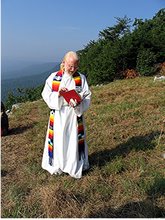Regarding “speaking in tongues,” I like Phillip’s translation “speaking in ecstatic language.” A more phenomonological description however, would be “the ecstatic experience resulting from an inner speech.” The first “speaking in ecstatic language,” is the behavior observed from without. The second, “the ecstatic experience” is viewed from within.
In other words, it is not tongues that is ecstatic speech, it is ecstatic states produced by the speech.
In studying humans, psychologists took two approaches: describe behavior from outside the person or described the inner experience. The first, the easy one, was called Behaviorism. The second proved more difficult and was called Phenomonology, i.e., “the study of the phenomena.”
Shifting then from outside the person to inside, what then is it like to have an ecstatic state produced by a strange source from within?
As a trained phenomnologist, I will turn my awareness inward. Using my awareness like a flashlight, I come upon sounds that seem like speech. Trying then not to turn myself into an outside observer of myself, I enter and abandon myself to the experience.
Later, I can leave the phenomonological approach and return to the external approach. Studying myself externally, I realize that I am being led into all the other experiences described by the New Testament disciples.
After the ecstatic experience, I become more in love with the Word of God, both written and in Jesus of Nazareth. I discover myself growing in the ability to perform miracles.
Thus, by approaching myself phenomonologically, I live the ecstatic experience. Then, studying myself behaviorally, I get to evaluate the benefits and compare them with those of the original Biblical writers.
Ah!. It is great to be a psychologist!
Monday, April 2, 2007
Psychologist and praying in the Spirit
Posted by
Blogger
at
12:51 PM
![]()
Labels: Charismatics, Psychology and Relgion, Speaking in Tongues
Subscribe to:
Post Comments (Atom)





0 comments:
Post a Comment